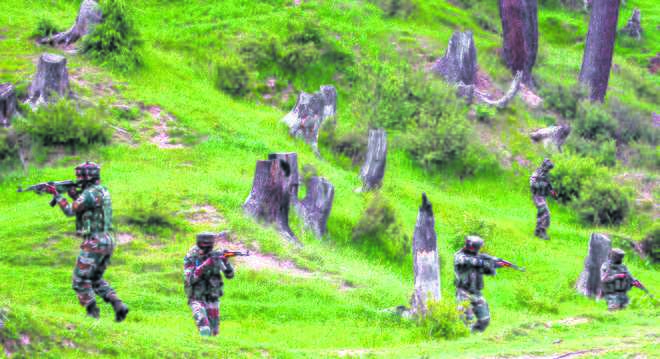On October 13, the GCM pronounced its verdict and held seven persons guilty. Life imprisonment was awarded to Major-General AK Lal and six others

Ajay Banerjee in New Delhi
SOMETIME in the middle of July this year, the Army commenced General Court Martial (GCM) proceedings to try a major-general and six others for an alleged extra-judicial killing carried out in Tinsukia, Assam, in 1994. The case came to be known as the Dangari Fake Encounter.
Before the GCM was commenced, the Army sought permission to try these officers and men under the Army Act, 1950. This was allowed despite the CBI having already filed a chargesheet in the Guwahati High Court under an FIR (RC-4/S/2000-CAL) lodged by its Kolkata unit in 2000.
On October 13, within three months, the GCM pronounced its verdict and held seven persons guilty. Life imprisonment was awarded to Major-General AK Lal, Colonel Thomas Mathew and Colonel R S Sibiren and junior commissioned officers (JCOs) and non-commissioned officers (NCOs) Dilip Singh, Jagdeo Singh, Albindar Singh and Shivendar Singh.
Assam Chief Minister Sarbananda Sonowal, who had taken to the streets demanding justice almost quarter a century ago, welcomed the verdict saying, “It will give solace to the families of the victims…. The Army has worked in a fair manner and without any prejudice”.
The ‘limitation’ loophole
On the face of it, the verdict looks like speedy justice. Officers who have served in the Army’s Judge Advocate-General (JAG) branch are skeptical. They say the accused can use the ‘loophole’ created by the conduct of the GCM. They can easily cite ‘time limitation’ as applicable under Section 122 of the Army Act. A GCM cannot be conducted after three years of ‘the competent authority having acquired knowledge of occurrence of the event’. Since the CBI lodged the FIR in 2000 and filed a chargesheet, the facts would have been communicated to the Army.
Col NK Kohli (retd), who has served in the JAG branch, says: “Based on the facts that have come out in the media, the case pertains to 1994 while the CBI registered an FIR in 2000. The ‘time limitation’ — of three years — will start from the day the Army (the competent authority) acquired knowledge of the case. It’s beyond comprehension as how the Army had no knowledge of the case since 2000 when the CBI filed a charge sheet in the court”.
Another expert on legal matters of the Army, on condition of anonymity, cited the case of Colonel Rajvir Singh vs Ministry Of Defence. In his case, the Supreme Court said the Army Commander of Central Command knew of the case as on May 2007 and the GCM was convened in August 2010. The SC in 2012 said it was clearly beyond the period of three years, and hence barred in terms of Section 122.
“One feels sorry to see a trial on such serious charges being aborted on grounds of limitation but that is the mandate of the law,” the order said.
Insiders who understand the legal system say it would have been better to allow the Guwahati High Court to go ahead with the CBI charge sheet as it would not be barred by time-limitation.
The findings of the GCM will have to be confirmed by the Army’s higher authorities — the Eastern Command at Kolkata and the Army headquarters in Delhi. They can agree, partially agree, or even disagree on life imprisonment verdict. The accused can then file an appeal against the verdict in the Armed Forces Tribunal and follow that up with case in the Supreme Court.
What is the case?
Nine activists of the All-Assam Students’ Union (AASU) were picked up by 18 Punjab Regiment from different places in Doomdooma in Tinsukia from February 17 to 19, 1994. Five of the activists — Prabin Sonowal, Pradip Dutta, Debajit Biswas, Akhil Sonowal and Bhaben Moran — were allegedly gunned down near the Dangari river. The Guwahati High Court, which heard a habeas corpus plea, ordered the Army to produce the nine activists at the nearest police station. Statewide protests followed as five of the nine had died. At that time Sonowal, the now Assam Chief Minister, was president of the AASU. The matter was handed over to the CBI at the behest of the court.
Revisiting Army justice
A five-member committee of experts that had Lt-Gen Mukesh Sabharwal (retd), a former Adjutant General of the Army and Lt-Gen Richard Khare (retd), a former military secretary, suggested radical changes in a report in 2015. The committee was tasked by Defence Minister Manohar Parrikar to review “service and pension matters, including potential disputes, minimising litigation and strengthening institutional mechanisms related to redress of grievances.”
Citing the Army and Air Force Acts in 1950 and the Navy Act in 1957, the committee said, “These were enacted soon after Independence and reflected the mindset of a force of occupation. These were modelled on provisions of the Crown.”
“The independence of judiciary and separation of powers in the civilian set-up in letter and spirit, which, even as on date, remain a far call in the military”, it said adding, “We have ad hoc juries comprising non-judicial and non-legally trained members”. It was referring to how a GCM is conducted by a serving military officer, who may or may not have legal grounding.
The committee suggested provisions making military justice independent and totally insulated from influence of higher ups in the chain of command.
